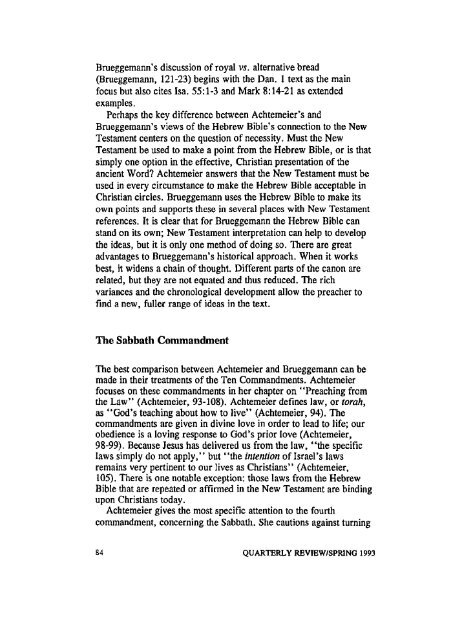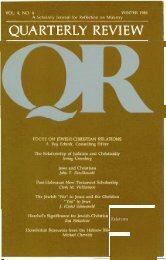TJieodore W. Jennings, Jr. The Meaning of ... - Quarterly Review
TJieodore W. Jennings, Jr. The Meaning of ... - Quarterly Review
TJieodore W. Jennings, Jr. The Meaning of ... - Quarterly Review
You also want an ePaper? Increase the reach of your titles
YUMPU automatically turns print PDFs into web optimized ePapers that Google loves.
Brueggemann's discussion <strong>of</strong> royal vs. alternative bread<br />
(Brueggemann, 121-23) begins with the Dan. 1 text as the main<br />
focus but also cites Isa. 55:1-3 and Mark 8:14-21 as extended<br />
examples.<br />
Perhaps the key difference between Achtemeier's and<br />
Brueggemann's views <strong>of</strong> the Hebrew Bible's connection to the New<br />
Testament centers on the question <strong>of</strong> necessity. Must the New<br />
Testament be used to make a point from the Hebrew Bible, or is that<br />
simply one option in the effective, Christian presentation <strong>of</strong> the<br />
ancient Word? Achtemeier answers that the New Testament must be<br />
used in every circumstance to make the Hebrew Bible acceptable in<br />
Christian circles. Brueggemann uses the Hebrew Bible to make its<br />
own points and supports these in several places with New Testament<br />
references. It is clear that for Brueggemann the Hebrew Bible can<br />
stand on its own; New Testament interpretation can help to develop<br />
the ideas, but it is only one method <strong>of</strong> doing so. <strong>The</strong>re are great<br />
advantages to Brueggemann's historical approach. When it works<br />
best, it widens a chain <strong>of</strong> thought. Different parts <strong>of</strong> the canon are<br />
related, but they are not equated and thus reduced. <strong>The</strong> rich<br />
variances and the chronological development allow the preacher to<br />
find a new, fuller range <strong>of</strong> ideas in the text.<br />
<strong>The</strong> Sabbath Commandment<br />
<strong>The</strong> best comparison between Achtemeier and Brueggemann can be<br />
made in their treatments <strong>of</strong> the Ten Commandments. Achtemeier<br />
focuses on these commandments in her chapter on "Preaching from<br />
the Law" (Achtemeier, 93-108). Achtemeier defines law, or torah,<br />
as "God's teaching about how to live" (Achtemeier, 94). <strong>The</strong><br />
commandments are given in divine love in order to lead to life; our<br />
obedience is a loving response to God's prior love (Achtemeier,<br />
98-99). Because Jesus has delivered us from the law, "the specific<br />
laws simply do not apply," but "the intention <strong>of</strong> Israel's laws<br />
remains very pertinent to our lives as Christians" (Achtemeier,<br />
105). <strong>The</strong>re is one notable exception: those laws from the Hebrew<br />
Bible that are repeated or affirmed in the New Testament are binding<br />
upon Christians today.<br />
Achtemeier gives the most specific attention to the fourth<br />
commandment, concerning the Sabbath. She cautions against turning<br />
84 QUARTERLY REVIEW/SPRING 1993












